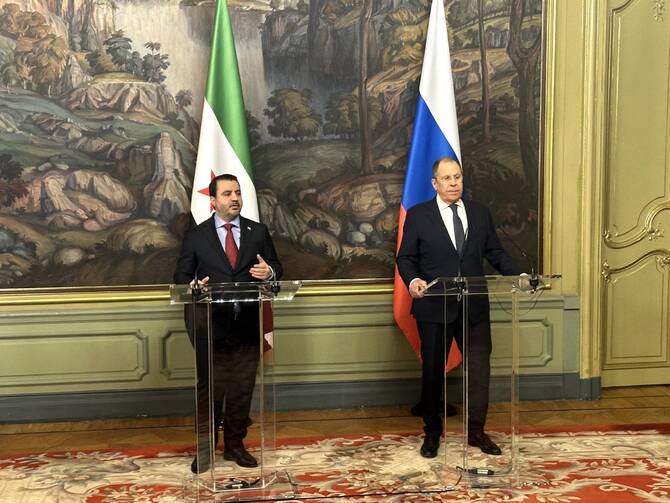
- ARAB NEWS
- 01 Aug 2025

DUBAI: Syrian Foreign Minister Asaad Hassan al-Shaibani arrived in Moscow on Thursday, leading a high-level delegation for an official visit aimed at reaffirming ties with Russia amid Syria’s political transition, state news agency SANA reported.
The visit marks the first formal engagement between the two nations since the overthrow of former President Bashar al-Assad last year, whose Moscow-backed government fell to a rapid rebel offensive that ended nearly five decades of Assad family rule. Assad reportedly fled to Russia following the collapse of his regime.
In his meeting with Russian Foreign Minister Sergey Lavrov at the Russian Foreign Ministry’s Guest House, al-Shaibani said Syria seeks to build a “correct and sound relationship” with Moscow based on “cooperation and mutual respect.” He emphasized that the new leadership represents a vision of unity and reconstruction for Syria, which has faced years of conflict and instability.
“We are here today to represent the new Syria,” al-Shaibani said. “We have worked since December 8th to fill the political, civil, and service vacuum. We have preserved civil institutions and are working to reunite Syrians at home and abroad.”
Lavrov reaffirmed Russia’s interest in supporting Syria during its transitional phase. “We are closely following the ongoing events in Syria. We sincerely hope the friendly Syrian people, with whom we have historically cooperative relations, will overcome current challenges,” he said.
Lavrov also recalled their earlier discussions in Turkey and expressed hope that President Ahmad al-Sharaa, who succeeded Assad, would attend the first Russian-Arab summit on October 15th.
While both sides emphasized continued cooperation, questions remain about the future of Russia’s military presence in Syria. Moscow’s naval base in Tartus and air base at Hmeimim, both located on Syria’s Mediterranean coast, are its only official military outposts outside the former Soviet Union. It remains unclear whether the new Syrian government—once opposed by Russia during the civil war—will allow those facilities to remain operational.
Al-Shaibani acknowledged these challenges but described the moment as an opportunity to “build a united and strong Syria” and expressed hope that Moscow would stand by Damascus in this effort.
REUTERS